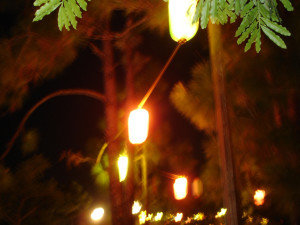In Japan, it is the time of Obon. At least in some parts of Japan… for this festival honoring the dead is one of shifting dates depending on region and calendar. Some places, like Tokyo, celebrate in July (this is called Shichigatsu Bon); others in August (Hachigatsu Bon). And then there is Kyu Bon (Old Bon) and this is based on the lunar calendar. Hachigatsu Bon and Kyu Bon are typically celebrated around the 15th of August. But the celebration lasts for three days; most likely things are getting started about now for a celebration that will probably peak on Saturday.
Obon is an outdoor festival that rings with the sounds of street vendors, taiko drums, and the music of set dances. The drummers and their accompanying flutists may be set up atop a yagura, an elevated platform decorated with red and white streamers. Lanterns are strung from the yagura to illuminate the scene once night falls. Around the yagura go the dancers, their motions slow and graceful and very methodical, the dances communal, old and traditional. They are called bon odori: familiar steps, familiar sights each year.
Thanks to the presence of the Morikami Museum in Delray Beach, Obon used to be a big part of the summer cycle here in South Florida. The beach, the heat, the humidity, thunderstorms most afternoons, and Obon: these were the things we could count on as part of what is constant about this land where summer lingers long. Since it is an outdoor festival, the heat and humidity assured you that it would be a sweaty time and the afternoon thunderstorms lent an air of excitement to Obon each year: Would there be a downpour? Wise Obon goers at the Morikami kept an eye open for the nearest shelter should the weather turn.
Eventually the Morikami built a shelter to contain the yagura and dancing, and while that protected everyone from the good chance of rain, it also protected us from the expansive night sky: the stars and the clouds and the evening breeze. It was the beginning of a downward spiral of protection. Nowadays the Morikami doesn’t even let us sweat: they’ve moved the festival to October, when it is cooler, and they call it Lantern Festival. In their good intentions, they’ve made Obon safe and also devoid of meaning, for it has lost its connection to the wheel of the year. Summer here is no longer the same: our local Obon celebration has become one of the dead we honor at this time of year.
The most beautiful part of Obon is something we can almost all celebrate in some way, whether as a community or on our own. It is what the Japanese call Toro Nagashi: the lighting of lanterns that are set afloat on the water. It is believed at Obon that the spirits of the dead return to the land of the living for a brief visit. But of course they must return home again. As night falls on the third night of the festival, lanterns––hundreds, or thousands, depending on the community––are illuminated and floated out to sea. At the Morikami, which is far from the ocean, the lanterns float across Morikami Pond. You, too, can make simple lanterns for Obon. A small piece of wood, a bag on top, some sand inside nestling a little tea light: these are all that is necessary. You might write a message on the paper bag or decorate it somehow. Sumi ink is traditional, but not required. Your lantern can be set on a pond, on a lake, on the ocean’s shore. The lanterns carry the souls of the ancestors, back to their homes on the distant shore across the water. We set them on their way, wish them well, look forward to their return.
Image: Electric lanterns at the Morikami’s Obon festival, many years ago, strung in the trees from the yagura and through the ennichi street fair, above the vendors, above the dancers, above the spirits.

Obon already? Feels like just yesterday…
Right?! That wheel turns faster and faster.
When I was very young, grade school young, my grandfather died. He was not the first person I lost, but the closest. I spoke to him often after he passed, and to this day I will call his name to find out whether he’s still hanging around. I’ve lost many close people over the ensuing decades and I speak to them. They answer sometimes. Culturally, the Obon festival would have helped me share that spirit. I’m happy to have my conversations and happier still to know others do as well. As always, thanks John!
I think those conversations are important, Guy. Thanks for sharing that. I’m happy to know these things.